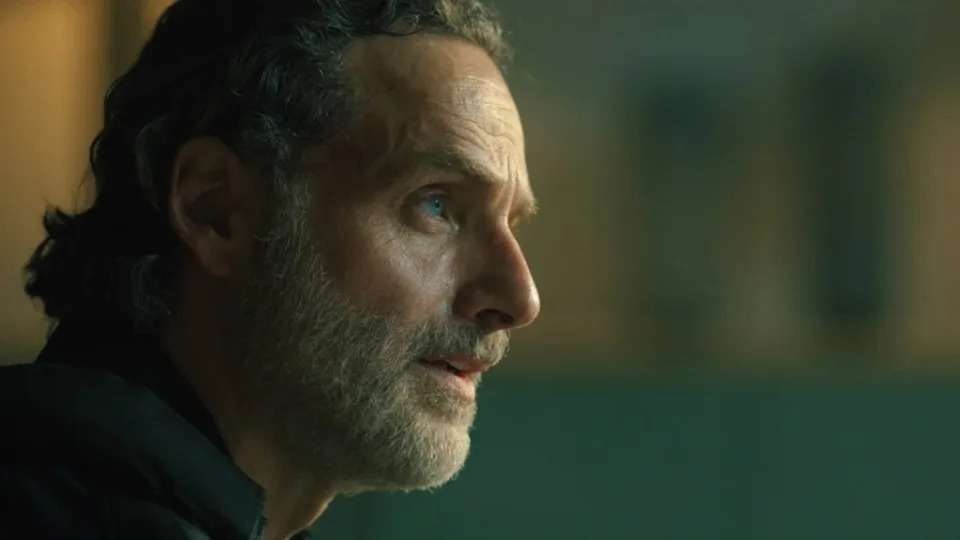The fourth episode of “The Walking Dead: The Ones Who Live” feels more like a play than an entry in one of the biggest, most action-packed franchises on television.
“They needed to have a timeout,” Danai Gurira, series star and the writer of “What We” told TheWrap of Michonne and Rick (Andrew Lincoln).
Set in a luxury apartment complex that seems relatively untouched by the apocalypse — save for a handful of starving zombies — Episode 4 of AMC’s latest miniseries zooms in on the main couple’s relationship. After risking her life for years to find her love, Michonne is forced to face an uncomfortable truth: Rick doesn’t want to return with her.
“They needed to have a real conversation. She had to really understand what was going on because he was making no sense to her at all,” Gurira said.
This emotional bottle episode was planned early on by Gurira, Lincoln and “The Ones Who Live” executive producer and “The Walking Dead” universe chief content officer Scott M. Gimple. At that point, the three knew that there would be a central tension between Rick wanting to stay with the Civic Republic Military and Michonne wanting him to return home with her. Though they all agreed there were practical reasons for Rick wanting to stay, none of them understood the emotional truth of this decision until Gurira stepped in to write the episode (the first “Walking Dead” episode she ever wrote).
“That was established, really, on the page,” Gurira explained. “The fear of losing her again and how he doesn’t feel he’ll survive it … We could logically explain [his decision to stay]. But that’s not good enough. There has to be something really deeply emotional, the wounds and the trauma. Basically, the PTSD has to be at the core of why he’s behaving this way.”
In order to better understand Rick’s mindset and fears, Gurira did a great deal of research into post-traumatic stress disorder. Through her research, she learned that, for most people, discovering their diagnosis is a journey that requires self-reflection as well as intervention from those around them.
“It’s something that is going to take a while and take a lot for him to be able to articulate. That’s really that I found as I wrote it,” Gurira said.
As soon as this episode was discussed, Gurira knew she wanted to utilize her talents as a playwright to explore the emotional moment. Previously, Gurira wrote the Tony-nominated Broadway play, “Eclipsed.”
 Andrew Lincoln as Rick Grimes in “The Walking Dead: The Ones Who Live” (Photo Credit: AMC)
Andrew Lincoln as Rick Grimes in “The Walking Dead: The Ones Who Live” (Photo Credit: AMC)“It was that balance of the brutality of the world and the wounds that they haven’t worked out yet due to all this time apart,” Gurira said of what drew her to the episode. “It also has to retain its aspect of being a deeply invested love story. I was interested in making that balance work.”
The answer to striking that balance came in the form of a lovemaking scene between Rick and Michonne. After their fight, Michonne storms out and Rick follows her. It isn’t long before the pair is overtaken by a horde of zombies. Initially, their fighting is sloppy and unorganized “because of all of the emotional baggage that they’re carrying,” Gurira said. But once they escape that threat and Rick saves Michonne from a fallen chandelier, their emotionally charged episode shifts to one that’s far more intimate.
“That’s what that scene is between him and her on the bed. She has to get to the point where she’s even equipped to journey him through [his PTSD] because before she was just getting frustrated,” Gurira said. “It’s only in the lovemaking scene where she then realizes, ‘Oh my god, he’s going through wounds that he can’t articulate. I have to take a whole different approach here.’”
Prior to the sex scene, Gurira said that Michonne was at a “breaking moment.” “It was devastating, but it was also like, ‘I have to go back to my children. I can’t beg him to love his children and love me enough to come home,’” Gurira said. “It’s kind of a breaking moment where you’re like, ‘Are they going to be able to stay together?’”
Though the reconnection between this fan-favorite couple happens in the bedroom, Gurira was careful to ensure that this scene was about more than just sex.
“Something shifts in her understanding and in his revealing of himself. That’s really what that moment is,” she said. “It’s her understanding, ‘OK, he’s in trauma. I have to take a whole new approach to understanding that’s what’s causing this behavior.’”
To get to this moment, Gurira had to dig into “the bowels of the humanity of the story.” “It has to be the humanity of the characters and who this man is, but it can’t be a logical reason,” she explained. “That doesn’t work. It’s not satisfying. It’s not truthful to the human condition. It had to be something much deeper, causing him to cut himself off from going back home. So in pursuit of that understanding of him and of his humanity, that’s what came.”





